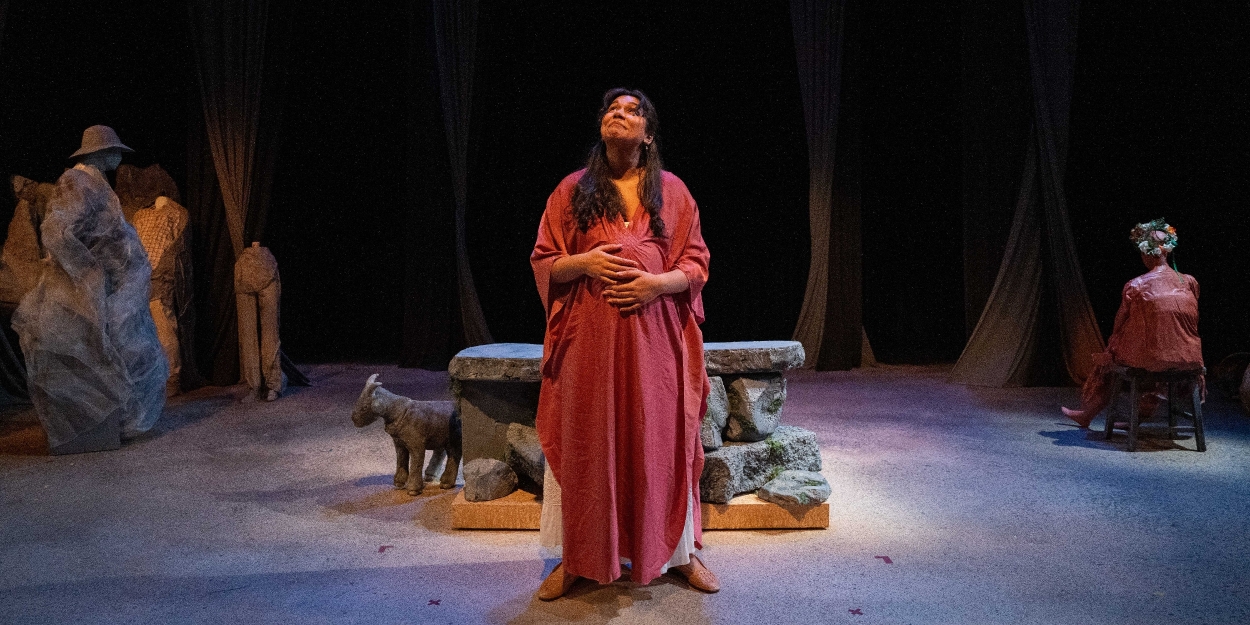Review: DUA: THE MONSTER'S STORY at Theatre Prometheus
Runs through Saturday, June 1.

Theatre Prometheus begins its new season with the world premiere of Dua: The Monster’s Story. Written and directed by Robin Berl, who won Theatre Prometheus’ 2022 “Pitch Your Passion” program, the play is a retelling of the myth of Medusa that reframes the story entirely, giving the monster the chance to speak.
In the most well-known version of the myth, Medusa was a beautiful woman who was assaulted by the sea god Poseidon in the Temple of Athena. As punishment for desecrating her temple, Athena transformed Medusa into a gorgon, a snake-haired monster, and anyone who looked upon her would turn to stone. The hero Perseus, sent by Athena, kills Medusa and takes her head. In the classic tale, Medusa is merely a monster in Perseus’ story of heroism. In Dua, however, Robin Berl writes Medusa, lovingly nicknamed “Dua,” as the protagonist.
The play begins in the immediate aftermath of Athena’s curse as Medusa (played by Caitlyn Hooper) is chased by a man into a dark cave. As she attempts to reason with him, she looks at him and he turns to stone. At first, Dua is certain this power is a gift from Athena, something to protect her, or perhaps a test of her faith. As she acclimates to her new reality, she settles into the cave that has become her home, creating a figurine of her sister to keep her company, and bringing in stone animals and flowers for decoration.
In Dua, Berl not only allows Medusa to tell her own story, but she brings to life the very cave Dua has taken refuge in. Twin characters Inhale (Emma Wesslund) and Exhale (Marley Kabin), two parts of a breathing cave, choreographed by Shana Laski, glide about the cave between scenes, reacting to Dua’s circumstances, feeling her pain and sorrow, and echoing, no doubt, the sympathy felt by the audience. At some points, the appearance of these characters can feel disjointed—more of an interruption than an accent, but overall, with Inhale and Exhale, the cave itself becomes a storyteller and spectator, giving the emotions of the play even deeper resonance.
As time passes, Dua realizes that she is pregnant. Deciding to continue her pregnancy, she begins to more desperately call on Athena for an explanation. When the goddess does finally appear, Dua learns the terrible truth. Dua’s devotion to beauty, gentleness, and family keeps her sustained as she begins to understand that her power, her isolation, her new monstrousness are in fact a cruel curse. Hooper’s Dua is youthful, bright, loving, and deeply empathetic, even in her final moments. She gives a remarkable portrayal of this classic monster that makes the story’s tragic end all the more heartbreaking.
In this retelling of the Medusa myth, Robin Berl creates unique opportunities for new exchanges between key characters. When Athena visits the cave and reveals the truth of Dua’s curse, the goddess’ cruelty becomes even more prominent. And as Athena realizes the truth of what happened in her temple, audiences can glimpse an (albeit brief) moment of self-reckoning before she doubles down on the punishment, telling Medusa that her death at the hands of Perseus is imminent. “You will let him have his little hero moment,” she declares.
When Perseus (Elgin Martin) arrives at the cave and begins to make his way through the barricade of stone men, he and Medusa converse. She begs for her life and insists on her own humanity, while he, confused, muscles through the task out of a sense of duty to his goddess and his mother. The best part of this scene, and one of the strongest parts of Berl’s retelling, is that it gives Medusa a chance to know Perseus’ mother’s story, that of another woman taken advantage of by a god and punished for it. Watching Medusa resonate with Persus’ mother’s story is something truly special.
In this scene, as in so many others, Dua: The Monster’s Story urges audiences toward empathy. It is a remarkably compassionate play that brings emotional depth to not only Medusa’s character, but all of the characters, ultimately asking us to consider what might happen if we have mercy on monsters.
Dua: The Monster’s Story is onstage at the Montgomery County Cultural Arts Center through Saturday, June 1. Run time is approximately an hour and a half with no intermission. Purchase tickets at the link below.
Photo credit: Sarah Straub.
Comments
.png)
|
.png)
|
Videos

